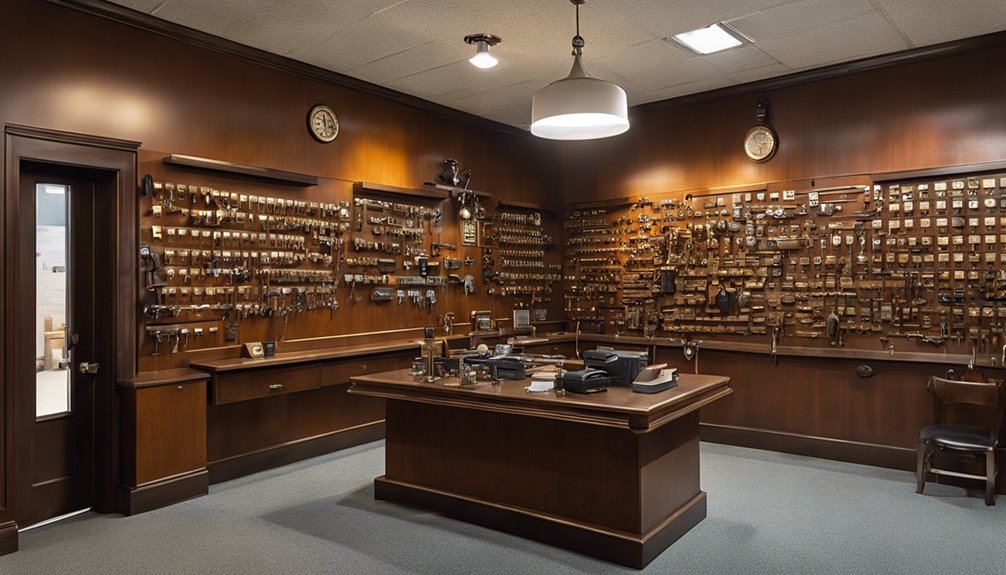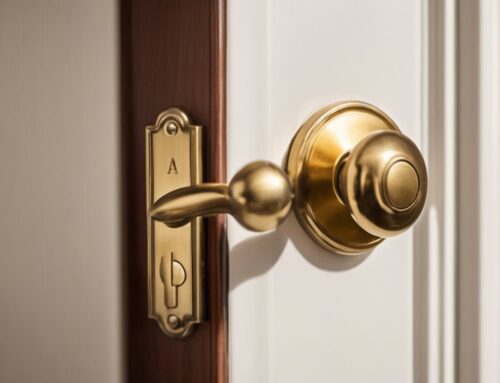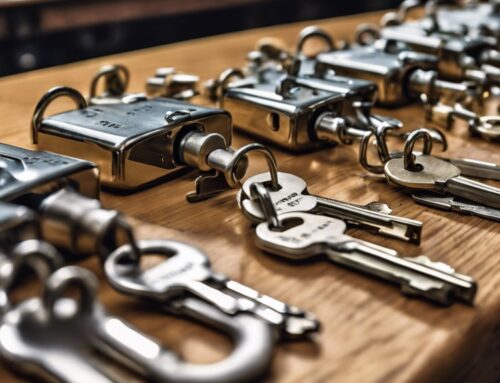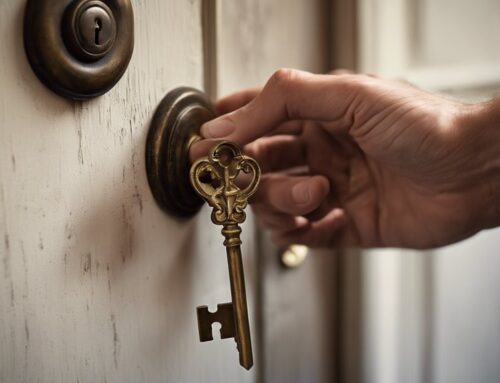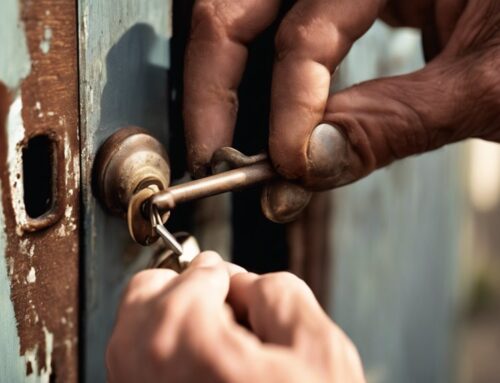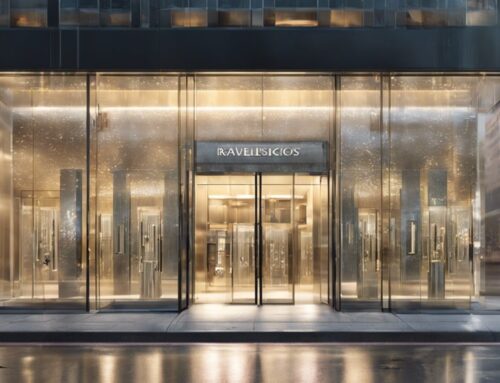Locks symbolize security, but without proper regulation, that security can quickly turn into vulnerability. In Illinois, there's a robust framework designed to guarantee locksmiths operate ethically and transparently, but you might be wondering just how effective these measures really are. As you consider the licensing requirements and the role of the IDFPR, think about the implications on consumer safety and trust. What happens when regulations falter, and who truly benefits from these standards?
Key Takeaways
- IDFPR conducts thorough background checks, including fingerprinting, to ensure applicants have good moral character and are trustworthy for locksmith services.
- Licensing requires completion of a 20-hour basic training course, ensuring locksmiths possess essential skills to perform their duties safely and effectively.
- The ALOA examination evaluates knowledge in key origination, servicing locks, and professional techniques to maintain industry standards and competence among locksmiths.
- Consumer complaints can be filed with IDFPR regarding unlicensed or fraudulent activities, promoting accountability and protecting consumers from scams.
- Mandatory general liability insurance of $1 million is required post-examination, providing financial protection for consumers against potential damages or errors.
Licensing Requirements Overview

In Illinois, aspiring locksmiths must navigate a series of licensing requirements designed to guarantee competence and reliability. To qualify, you need to be at least 18 years old and prove good moral character. If you've been convicted of a felony, make certain at least 10 years have passed since your full discharge from the sentence. A dishonorable discharge from the armed forces or any issues with alcohol or substance abuse can also disqualify you.
Education and training are essential parts of the process. You must complete an approved 20-hour basic locksmith training course. While formal education isn't required, you could gain invaluable experience through a locksmith school or by apprenticing under a seasoned locksmith. Additionally, gaining experience through structured training programs can enhance your skills and prospects. Proper training is essential because it equips locksmiths with the necessary skills to handle the tools and techniques of the trade, ensuring they meet apprenticeship laws effectively. If you take the Associated Locksmiths of America (ALOA) examination, make sure you do so within three years of applying for your license. Continuous learning after initial certification is crucial, as ongoing education is required for license renewal.
Once you meet these preliminary steps, passing the Illinois Locksmith License Examination is necessary. This test contains 305 questions in multiple-choice and true/false formats and is held biannually in March and September. Don't forget—submit your application at least 60 days before the exam date.
Lastly, expect to undergo a fingerprint-based criminal history check and provide proof of at least $1 million in general liability insurance. These measures help guarantee that every licensed locksmith in Illinois is trustworthy and competent, assuring you of a reliable service provider when you need it most.
Role of IDFPR
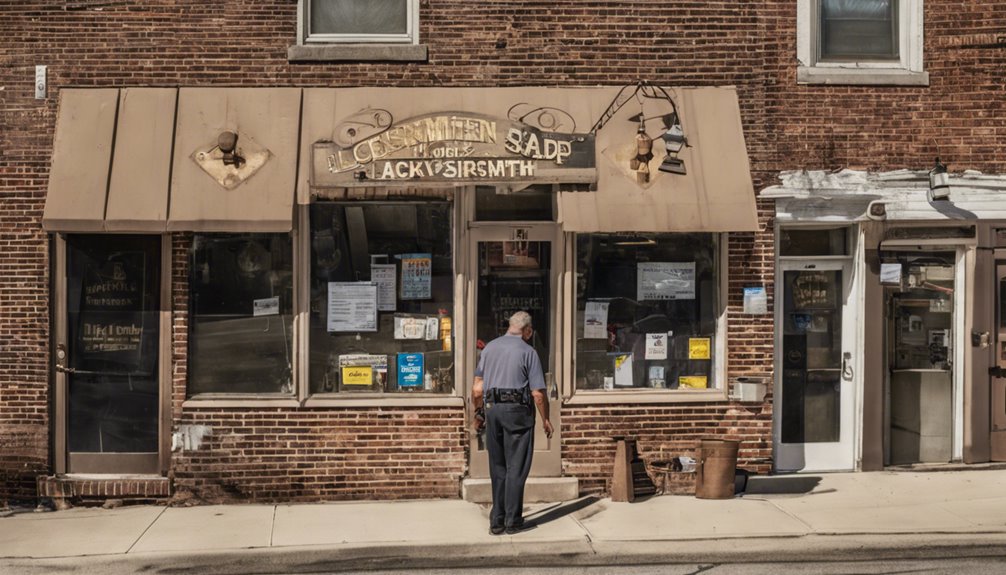
The Illinois Department of Financial and Professional Regulation (IDFPR) plays an essential role in overseeing the licensing and regulation of locksmiths in the state. This agency has set up a framework to guarantee that both individual locksmiths and locksmith agencies operate within the law, protecting the public from potential fraud and abuse.
Here are some key aspects of IDFPR's role:
- Licensing Administration: IDFPR issues individual locksmith licenses, which are mandatory for practicing locksmiths. Renewal and maintenance of these licenses are strictly regulated, ensuring compliance with essential lock safety standards.
- Background Checks and Moral Character: The IDFPR conducts thorough criminal background checks on all applicants, guaranteeing that only those demonstrating good moral character receive licenses. Any negative findings can lead to denial or revocation. Additionally, tenant lock change laws require landlords to follow regulations, which adds an extra layer of security for consumers.
- Complaint Handling and Enforcement: When consumers file complaints about locksmiths, the IDFPR reviews these through an online form. The board evaluates complaints before administrative law judges impose any penalties or fines, creating a transparent process for accountability.
- Regulatory Oversight and Sunset Clause: The IDFPR will continue to oversee the locksmith industry until January 2029, when the licensing law is scheduled to be repealed. Critics warn that this could lead to unregulated practices, potentially endangering public safety. Additionally, a valid locksmith license is essential for employment or business operation, further solidifying the need for regulation.
Through these measures, IDFPR aims to maintain a high standard within the locksmith profession, guaranteeing that you, as a consumer, can trust the individuals handling your security needs.
Examination Process

To become a licensed locksmith in Illinois, you must navigate a structured examination process that confirms you meet the profession's standards. First, you'll need to submit an application to the Illinois Department of Financial and Professional Regulation (IDFPR), making sure that you pay all associated fees.
Be mindful to submit your application at least 60 days prior to the exam date to avoid any delays.
One critical step in this process involves a fingerprint-based criminal history check. You'll need to get your fingerprints taken within 60 days of submitting your application, which helps verify your moral character. Engaging in unauthorized locksmithing can bring severe repercussions, thus highlighting the importance of this step. This step is particularly crucial due to Illinois's commitment to protecting public safety, ensuring that only qualified individuals enter the profession.
Remember, you won't qualify if you've had felony convictions or a dishonorable discharge from the armed forces unless at least ten years have lapsed since your sentence.
For the examination itself, preparation is key. Study materials must cover topics like locksmith training, lock opening techniques, and ADA requirements.
You'll face a 305-question exam composed of multiple-choice and true/false questions, lasting four hours. Be ready; results will determine whether you move forward in obtaining your license.
Upon passing, you must provide proof of general liability insurance of at least $1,000,000. This thorough examination process confirms that you're equipped with the necessary skills and ethics to operate as a trustworthy locksmith in Illinois, protecting both yourself and your future clients. Additionally, it is important to note that licensing typically includes criminal background checks, enhancing public trust in locksmith services and regulating the industry.
Business Licensing Essentials
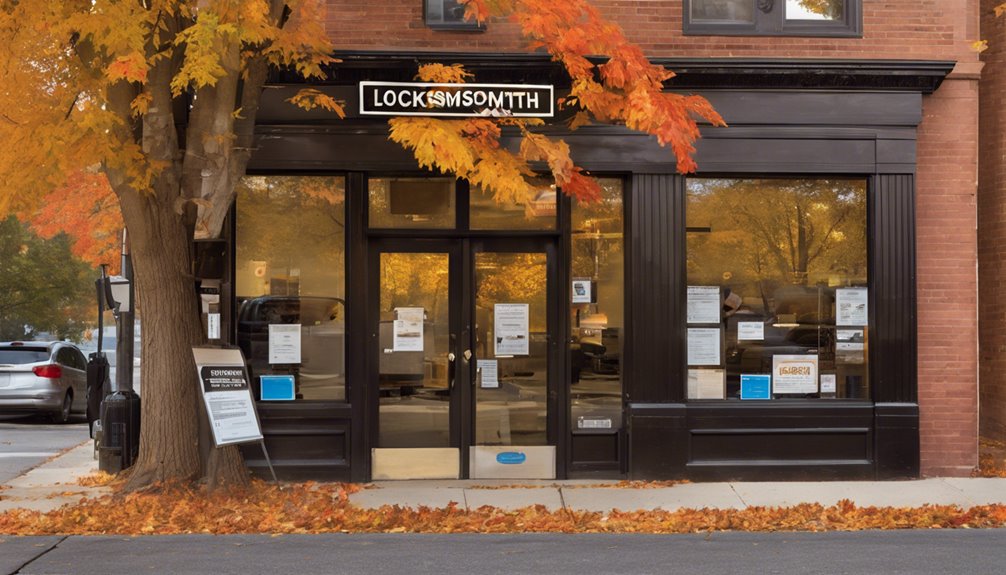
When you consider starting a locksmith business in Illinois, understanding the licensing process is essential. You need to navigate individual locksmith licensing, agency registration requirements, and designate a licensee-in-charge. Each of these elements guarantees that you operate legally and maintain compliance with state regulations. Additionally, adhering to Illinois laws regarding rekeying ensures that you provide services that protect tenant and landlord rights while avoiding legal complications. Understanding the legal landscape of key duplication is also crucial for your business, as it helps mitigate potential compliance issues associated with key duplication services.
Individual Locksmith Licensing Process
While maneuvering through the individual locksmith licensing process in Illinois, you'll need to meet specific eligibility criteria that guarantee you're qualified for this significant role. Here's what you need to keep in mind:
- You must be at least 18 years old.
- Good moral character is vital, with no felony convictions, or if any, at least 10 years must have lapsed since full discharge.
- An honorable discharge from the armed forces is required; a dishonorable one is unacceptable.
- You must be free from alcohol, substance abuse, or narcotic addiction.
Once you've verified you meet these criteria, you can apply through the Illinois Department of Financial and Professional Regulation (IDFPR) for the examination. The exam tests theory and practice, featuring 305 questions, and is conducted in March and September. Furthermore, ensure that your services comply with ADA regulations to better serve clients with disabilities.
You'll also undergo a fingerprint-based background check and pay necessary fees.
Upon passing the exam and background check, securing your license will enable you to operate legally in cities like Chicago and Aurora. Additionally, understanding the nuances of lock picking laws in Illinois can further enhance your credibility and professionalism in this field.
Agency Registration Requirements
After securing your individual locksmith license, the next step involves understanding the agency registration requirements necessary for operating a locksmith business in Illinois.
You'll need to determine your business structure, whether it's a sole proprietorship, partnership, or corporation. All trade names you intend to use must be disclosed, and you'll need a physical office address in Illinois—no P.O. boxes are allowed. If you don't have a principal office within the state, you must provide an out-of-state office located within 50 miles of the Illinois border.
Register your business with the state, and if you're using a fictitious name, also register with your local county as "doing business as." You must obtain an agency license if you plan to hire employees, and be prepared for license fees that could reach up to $300.
Each additional business branch requires separate registration. Make sure all employees engaging in locksmithing are also licensed, as compliance with the Illinois Administrative Code is vital for operational legitimacy.
Demonstrating good moral character through background checks and fingerprinting is essential for all applicants.
Licensee-in-Charge Designation
Understanding the licensee-in-charge designation is essential for any locksmith agency in Illinois, as it establishes accountability and operational integrity. This designation guarantees that there's a dedicated individual responsible for all aspects of the locksmith business, creating a standard for professionalism and compliance.
Here are some key responsibilities of the licensee-in-charge:
- Overseeing the delivery of professional services.
- Assuring compliance with the Act and related regulations.
- Maintaining records regarding employee training and conduct.
- Reviewing and approving contracts and proposals.
Moreover, the licensee-in-charge isn't just a title—it's a critical requirement for maintaining your agency's license. If you think about it, this person must be a full-time officer or employee who actively participates in the agency's operations.
It's also essential to notify the Division about any changes, like address, within a strict timeframe. Remember, the integrity of your locksmith business hinges on this role, as it helps protect clients from potential fraud and abuse.
Staying organized and communicative with regulatory bodies will make all the difference in guaranteeing smooth operations and compliance.
Consumer Complaint Mechanism
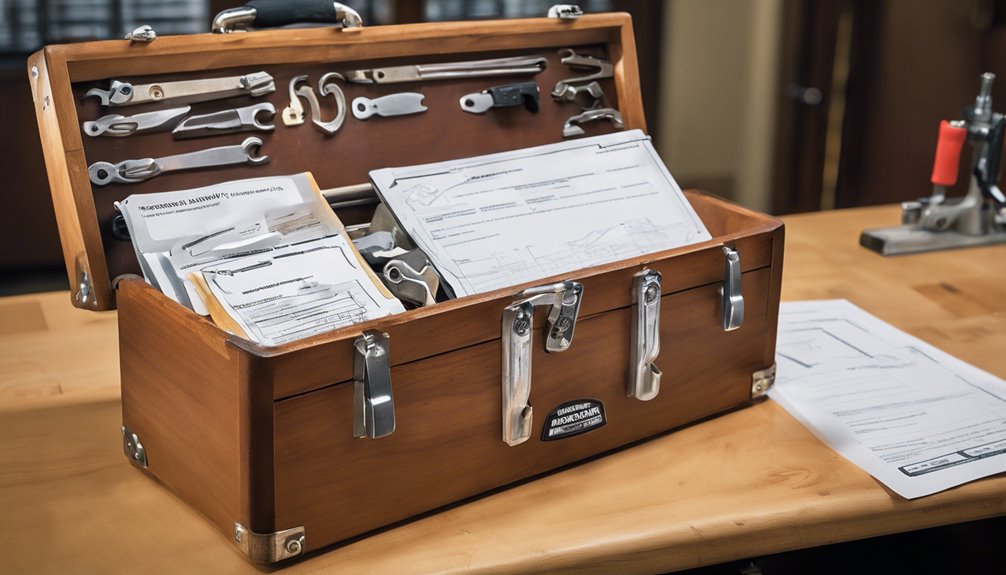
If you encounter issues with a locksmith, filing a complaint is an essential step to seek resolution and protect other consumers. In Illinois, the place to start is the Illinois Department of Financial and Professional Regulation (IDFPR). They handle complaints regarding unlicensed or fraudulent locksmith activities. When you file a complaint, make sure to include all relevant details—dates, times, and names of those involved. This information can be significant.
Once you submit your complaint, IDFPR will investigate to verify if any state laws or regulations have been violated. They take these matters seriously; if they find a locksmith is operating without a license or acting fraudulently, they've the authority to suspend that locksmith's license summarily. In serious cases, unlicensed locksmith work could be prosecuted as a misdemeanor or felony.
IDFPR actively collaborates with law enforcement to shut down fraudulent locksmith operations, ensuring consumer protection is paramount. For added support, you can also report your concerns to the state Attorney General's Consumer Protection office or refer to the Federal Trade Commission for additional resources on locksmith scams.
It's important to remember that your complaint not only seeks justice for yourself but also protects others from potential scams. IDFPR has dedicated resources to help consumers verify if a locksmith is licensed and educates the public about the risks associated with unlicensed service providers.
Importance of Background Checks
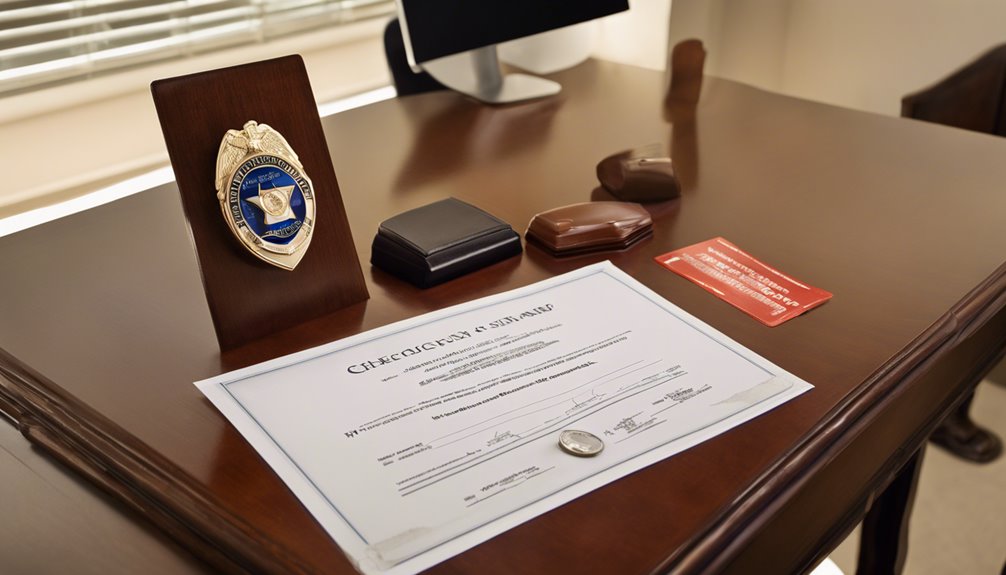
Background checks serve as an essential safeguard in the locksmith industry, ensuring that professionals are both qualified and trustworthy. In Illinois, these checks aren't just a formality; they play a pivotal role in protecting consumers and maintaining the integrity of the profession.
By examining criminal histories and backgrounds, you can avoid potential pitfalls when hiring a locksmith.
Here are four key aspects of the importance of background checks:
- Verification of Trustworthiness: Background checks verify criminal histories, filtering out individuals with serious offenses, ensuring only reliable locksmiths operate in the field.
- Prevention of Workplace Fraud: By validating past employment records and criminal backgrounds, these checks help minimize risks like theft or fraud, maintaining a safe environment.
- Regulatory Compliance: Illinois mandates fingerprint and criminal background checks as part of the licensing process, ensuring that all locksmiths meet specific moral and ethical standards.
- Long-Term Risk Management: Regular background checks promote a culture of honesty and protect businesses from potential legal liabilities, safeguarding your financial well-being.
Skills Assessment via Exams

In Illinois, the locksmith licensing exam serves as a vital assessment of your knowledge and skills in the field.
Covering a wide range of topics, the exam format guarantees that you're capable of performing essential locksmithing tasks safely and effectively.
Achieving certification not only validates your expertise but also enhances your professional credibility.
Licensing Exam Format
The Illinois Locksmith License Examination consists of 305 questions designed to assess a candidate's skills and knowledge in the locksmithing field. This written test, offered twice yearly in March and September, allows you four hours to demonstrate your expertise.
Candidates face multiple-choice and true/false questions, guaranteeing a thorough evaluation of the necessary skills.
Here are key elements of the exam:
- Content Focus: Topics include key origination, lock cylinder servicing, and professional opening techniques.
- Scoring: A passing score of 70% is required across all categories to confirm competency.
- Registration Process: Your application must be submitted along with fees and documents prior to the registration deadline.
- Exam Locations: The exam takes place in Hillside, IL, administered by Continental Testing Services, Inc.
It's important to note that if you miss the exam or let the window expire, there are no refunds for the testing fees.
Staying informed on registration deadlines and testing dates is essential for your licensing journey. Be sure to prepare diligently to meet the standards expected of licensed locksmiths in Illinois.
Knowledge and Skills Validation
Achieving a locksmith license in Illinois hinges on demonstrating your knowledge and skills through rigorous assessment. The examination process, held biannually in March and September, consists of 305 multiple-choice and true/false questions that you must complete in four hours. It covers key topics such as originating keys by code, professional lock opening techniques, and basic master keying.
You'll need to familiarize yourself with pin and disc cylinder servicing, lock cylinder terminology, and safety codes to succeed.
To be eligible, you must be at least 18 and pass a criminal background check, including fingerprinting. It's essential to apply at least 60 days prior to the exam, or you risk forfeiting your fee if you miss your chance within the year. Completing a fundamental 20-hour locksmith training course is also recommended to help you prepare.
You can opt to take the ALOA examination, which can expedite your path to licensure if it covers necessary sections. Additionally, maintaining general liability insurance is mandatory after you pass the exam, ensuring you're ready to practice responsibly as a licensed locksmith.
Importance of Certification
Certification serves as a vital benchmark for locksmiths in Illinois, confirming their expertise and readiness to meet industry standards. The certification process guarantees that you possess the necessary skills to serve the public securely and responsibly.
It's important for protecting consumers as it sets a high bar for all practitioners.
Here are four key aspects of the certification process:
- Examination Requirements: You must pass a thorough exam comprising 305 questions to demonstrate your knowledge of locksmithing principles and practices.
- Moral Character Assessment: Good moral character is essential; you can't have felony convictions or substance abuse issues, ensuring trustworthiness.
- Background Check: A detailed fingerprint-based background check protects the public from potential risks associated with unqualified locksmiths.
- Insurance Compliance: Carrying general liability insurance is mandatory, serving as a safety net that can protect you and your clients from unforeseen issues.
Future of Locksmith Regulation
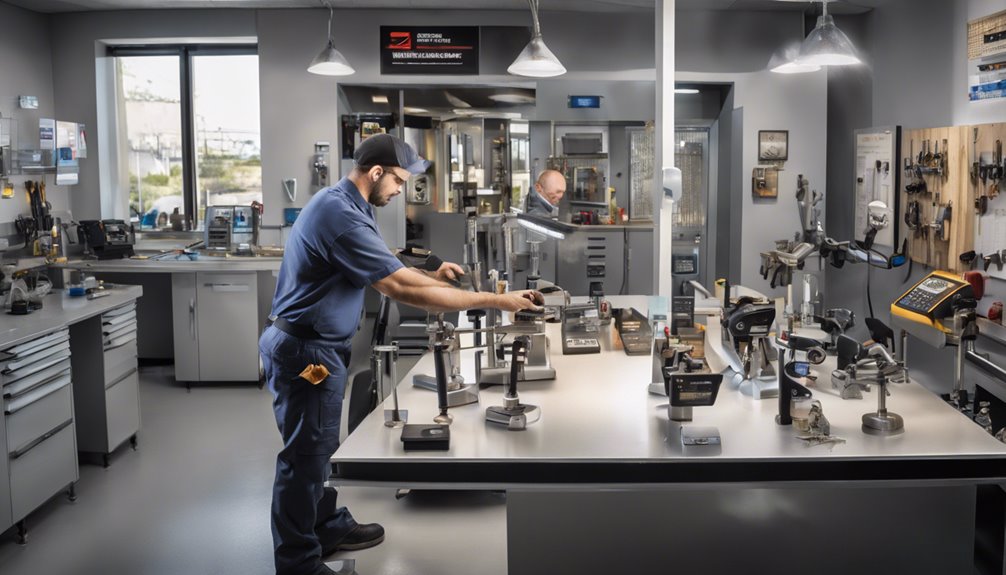
As Illinois approaches the sunset of its locksmith licensing requirements in 2029, stakeholders must consider how this change will reshape the regulatory framework of the industry. The current regulations, which include proficiency tests, background checks, and various fees, aim to protect consumers from fraud and exploitation.
However, the anticipated easing of access to the locksmith business raises questions about future industry standards. With the sunsetting of these stringent licensing requirements, you might see an influx of new locksmiths entering the market. While this could increase competition and potentially lower costs, it also highlights the need for alternative measures to guarantee consumer protection.
Without strict licensing, developing industry self-regulation or certification programs may become critical in maintaining service quality. Moreover, ongoing education and training will likely take center stage, enabling locksmiths to adapt to evolving techniques and technologies.
Collaboration between existing locksmiths and regulatory bodies can help establish new standards that safeguard consumers and preserve the integrity of the profession. Public awareness campaigns will play an essential role, too. By educating consumers about how to identify reputable locksmiths, you can empower citizens to make informed choices even in a less regulated environment.
As the locksmith industry navigates these upcoming changes, focusing on innovation in consumer protection will be crucial to prevent fraud and guarantee service quality remains a priority. This shift will require careful planning and cooperative efforts among all stakeholders involved in locksmith services in Illinois.
Risks of Reduced Regulation
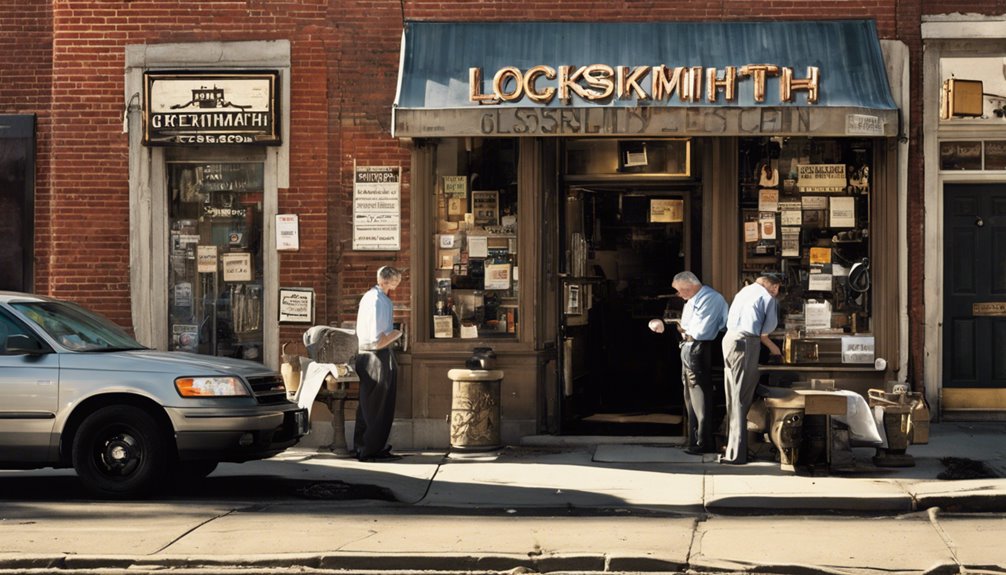
While the potential sunsetting of Illinois' locksmith licensing requirements may seem like an opportunity for growth within the industry, it also introduces significant risks that could jeopardize consumer safety and service quality.
If regulations are reduced, you might face the following dangers:
- Increased Fraud: Unlicensed locksmiths could operate with little oversight, leading to higher chances of scams and fraudulent activities.
- Lower Skill Levels: Without mandatory training, locksmiths may lack the expertise required for intricate jobs, raising the potential for errors and property damage.
- Safety and Security Concerns: Unlicensed individuals might skip crucial safety protocols, endangering you and your property. Background checks would also be more difficult to enforce, allowing potentially dangerous individuals access to your home.
- Reduced Legal Accountability: Fewer licensing requirements can weaken the mechanisms for accountability, making it harder for you to seek recourse if something goes wrong.
These risks could profoundly affect your trust and safety when seeking locksmith services.
The absence of a regulatory framework not only invites fraud and incompetence but can also escalate threats to personal security. As consumers desiring freedom, it's vital to weigh the advantages of less regulation against the potential for harm.
In a field where expertise and trust are paramount, the implications of reduced oversight could diminish service quality, leaving you vulnerable to inadequate workmanship and criminal activities.
Frequently Asked Questions
Can I Apply for a Locksmith License Online?
Yes, you can apply for a locksmith license online.
You'll begin by visiting the Illinois Department of Financial and Professional Regulation (IDFPR) website. There, you can complete the necessary paperwork and pay associated fees.
Remember to gather required documents, like fingerprint receipts and proof of liability insurance, as you'll need to include those with your application.
Utilizing the online process can simplify your submission and keep things organized.
What Is the Fee for the Locksmith Licensing Exam?
Applying for a locksmith licensing exam is like preparing for a journey—there's a cost involved.
You'll need to pay an application fee of $174, along with a $50 examination fee. If you opt to use ALOA examination scores, the alternative fee rises to $500.
Additionally, you'll face a variable cost for background check processing.
Always budget for the proof of $1 million in liability insurance, ensuring you're financially prepared for this path to freedom.
How Long Does It Take to Process a Locksmith Application?
Processing your locksmith application in Illinois typically takes around 30 to 45 days, provided you've submitted all required materials, including fees and fingerprints.
You'll need to schedule a fingerprinting appointment and wait for the results of your background check, which can affect your eligibility.
Plan ahead by ensuring you submit your application at least 60 days before the next exam to avoid delays and get on track for your licensure.
Are There Any Continuing Education Requirements for Licensed Locksmiths?
Imagine juggling flaming swords while blindfolded; that's how vital continuing education is for you as a licensed locksmith!
You've got to stay sharp and updated with industry standards to maintain your license. Illinois mandates that you complete approved courses before renewal every three years.
Missing deadlines? You risk losing your professional status.
Keep your records handy, follow the rules, and you'll be weaving through locksmithing like a maestro with no fear of missteps!
What Happens if a Locksmith Violates Licensing Regulations?
If you find yourself in a situation where a locksmith violates licensing regulations, expect significant consequences.
The board reviews complaints, and an administrative law judge may impose fines or other penalties. Fines can reach up to $15,000, depending on the violation's severity.
You might also witness a locksmith facing reprimands, license suspension, or revocation. These actions can affect their ability to operate, ensuring a level of accountability in the locksmithing profession.
Conclusion
In Illinois, the rigorous regulation of locksmiths serves as a significant safeguard against fraud and abuse. By enforcing licensing, thorough background checks, and mandatory training, the IDFPR not only protects consumers but also elevates the profession's standards. However, as some argue that reduced regulation could foster competition and lower prices, it is important to weigh these benefits against the potential risks of increased vulnerability to scams. Ultimately, maintaining strict oversight is critical for consumer trust and safety.

